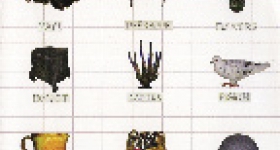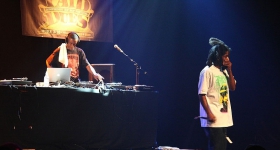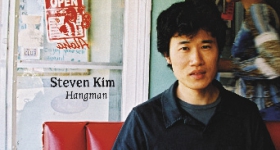ALL YOU HEAR is the rhythm and rhyme. Twenty or so young folks sit huddled in small circles free-styling before the Active Leadership to Advance the Youth hip-hop workshop begins. A solid beat drops through the mini speakers. They bob their heads in the lower level of the Filipino Community Center in San Francisco, mesmerized by the verses of Nomi.
Born in Nigeria, the Minnesota-raised Pinoy and former New York resident has found his home in San Francisco and caused a ruckus in the Filipino American arts community. He traveled to Italy, the United Kingdom and to every state in the continental United States during the last decade, touring first with his old hip-hop crew from Minnesota, Oddjobs, then with Kill the Vultures and finally with his current set, Power Struggle. All his travels and the things he's witnessed have contributed to his growth, both as an artist and as a person.
"While the West Coast is all about style and swagger, the Midwest has a slower pace, not about flash but all about the storytelling," Nomi says. "You learn to not be afraid of digging into your feelings and using music to deal with personal demons."
To him, New York was relentless.
"Everything is very in the moment, right then and there. There's no cookie cutter. No fluff. It's about the music and art scene. MCs cared more about the lyrics, which were influenced by their environments and ethnic backgrounds. It shaped their sounds," he says.
He's moved on from his earlier angst-filled, more demented and juvenile work. He's left behind more than 10,000 hours of on-the-road traveling, money-driven performances, drama and booze. He laughs about sitting on the can 10 minutes before curtain call, while his cohort brushed his teeth. He said goodbye to sleeping on promoters' floors and rock star status for something more worthwhile-serving the community through art.
"I was empty hustling in New York," he says. "At the end of the day, being more active in my community and fighting for social justice is more fulfilling than getting your ego stroked."
Although he was surrounded by a huge Southeast Asian population in St. Paul and Minneapolis, MN, the concept of an ethnic identity hadn't yet occurred to him. However, he later became inspired by the Black Panther Movement, educated himself about human rights and connected with other communities. A once immigrant himself, he realized the sacrifices that had to be made by his family and others like them.
"From Cali to Minnesota to New York, there are people who work really hard for what they do and won't ever be compensated. From the bottom to the broader society, some people will always be broke, living from check to check," he says. "I opened my eyes. This shit is unequal."
He left Minnesota at 21 and headed for New York two days before 9/11. But it wasn't until he came to California that he began to get more involved in the Filipino American community. Nomi experienced nothing short of a rude awakening at a Bindlestiff Studio event, "Bulaklak ng Dila."
Raw footage of Philippine military forces killing picketing workers outside the Hacienda Luisita Sugar Mill in 2004 consumed the screen like fire. The military police open fire on a picket line. You hear the barrrraaaat, pop, pop of gunfire. Bodies drop to the ground. The crowd scatters and the plantation hands quickly pick up their fellow workers.
"That fucking pissed me off and made me sad. What causes someone to shoot into a crowd?" he says. "All of a sudden I took a left in my road. Life became bigger than writing songs about wack rappers and heartache."
Nomi remains committed to the San Francisco Bay Area and engages in community work. As a hip-hop workshop facilitator at the Filipino Community Center, he encourages youth to think critically about their environment. He also works with various social organizations raising awareness on human rights and other social issues by performing his current album Hearts and Minds at events. Using his lyrics, he spreads the word about the people's struggle on songs such as "Workers Will Win" and "Deporting the Pilgrim."
Nomi's right arm bares a tattoo that says "Visaya" in Alibata, evoking his heritage. A tat on his left depicts a bolo, a writing quill, the Filipino flag's sun with three stars, and an empty banner that will one day read "dugot nang puso" (blood of my heart).
The blood of his heart makes him strong. It's the same blood that runs through the hearts of the youth he mentors. They rap about the violence, gentrification, apathy and inequality that they see within their communities. He remains mesmerized by their hope to see change as they spit their rhymes. Sometimes rappin' just ain't enough.
Christine Joy Ferrer is a native San Franciscan, journalist, choreographer and dancer. She has written for New America Media, InDance, Cityvoices.org and Filipinas Magazine, among other publications.









Comments